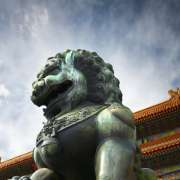
NIFA featured article - New Equilibrium: US-China Tensions and the Fate of Free Trade
Although the US-China trade dispute will likely be resolved in due course, the global trading order has been considerably weakened by US President Donald Trump’s administration. That was a consistent message across various sessions at the 2019 Nomura Investment Forum Asia in Singapore, along with the conclusion that America’s newfound protectionist bent is likely to persist regardless of whether Trump is reelected. On the other hand, fears of an armed conflict between the US and China are overdone, and the most pressing war in the years to come would be waged over technology and dominance in the industries of the future, the audience heard.
Whereas a majority of investors are now resigned to the likelihood of the trade war grinding on for the foreseeable future, both Nomura Research Institute Chief Economist Richard Koo and political analyst and former British diplomat Alastair Newton suggested the chances of a near-term resolution are better than most believe. However, Koo and Newton disagreed on the source of the compromise, with the former arguing the impetus would come from China and the latter predicting the US would initiate one.
Even if a US-China trade deal were reached, however, the global trading system has suffered permanent damage with “the end of the American century,” culminating in the US going from free trade champion to leading protectionist, according to Danny Quah, professor of economics at the National University of Singapore.
Moreover, Newton dispelled speculation that the increasing animosity between the two nations could escalate to armed conflict, as implied by the widely referenced notion of the “Thucydides Trap,” or the tendency for war to ensue whenever a rising power confronts a ruling one. “The probability of that happening is pretty low, in part because the US still has a massive edge over China as far as military capability is concerned,” he observed.
Instead, all three speakers concurred that investors would be better off focusing on the technology war, which could result in the world “bifurcating into different domains of technology,” said Quah. If that happens, Newton speculated that China’s technology systems would be adopted by much of Asia and many developing countries, while American technology dominated the Western hemisphere.
China’s motivation for compromise
In his keynote address that shed light on various topics, including the fate of free trade, Nomura’s Koo argued that China’s most urgent concern is to escape the middle-income trap, not that of Thucydides.
With the country’s working-age population having started to shrink since 2011 and the population as a whole set to peak in 2029, China only has a decade, Koo noted, to reach first-world living standards or risk getting mired at a middling level of income per capita as its population starts ageing.
“Chinese economists know that,” stressed Koo. “They cannot afford to spend three to five years fighting Trump on trade. That will force the Chinese to make compromises.” Koo added that many of the concessions demanded by the US would actually be beneficial for China's economy, such as enhancing protections for intellectual property, “which is absolutely essential to support innovation within China as well.”
Why Trump needs to strike a deal
Newton suggested it was the American side that would be more likely to compromise. During his discussion of key political risks in the year ahead titled, "Issues which keep me awake at night,” he emphasized that President Xi Jinping cannot sign any deal that has “even the merest echo” of the 'Unequal Treaties' through which Western powers and Japan forced China to open its markets in the nineteenth century, initiating what came to be known as the “century of humiliation.”
As a consequence, “any deal between China and the US is going to be about face rather than substance.” On the other hand, Newton believed Trump would be keen to conclude a trade deal with China ahead of going into the 2020 election. He predicted Trump and Xi would meet on the margins of the G20 summit at the end of June, “and may well cobble together some sort of deal.”
Losing from free trade
Trump's approach to trade is anchored in a longstanding view that under the current system of global trade, his country is losing while the rest of the world – and China in particular – is winning at its expense. That viewpoint tapped into the rage and dissatisfaction in America, noted Quah in his address, “How will Asia navigate the new world order?”
He asserted that unwavering advocacy of free trade is no longer politically feasible in the US given the general feeling among ordinary Americans that their jobs have been displaced and incomes eroded under the watch of elites. Koo also postulated that the orthodox understanding of how free trade works needs to be adjusted.
“Traditional economic courses taught us it creates both winners and losers in the same country, and as long as there is some form of income redistribution, everyone gains. But for that to happen, trade should be balanced over the long run. If you continue to run large deficits, as the US has done for the past 39 years, the number of losers grows so much that it’s going to have major political repercussions.”
According to Newton, if Trump were to be reelected, it is likely he would double down on many of his contentious policies, including withdrawing the US from the World Trade Organization (WTO), potentially marking the end of free trade as we know it. He also pointed out Trump’s “non-negligible” efforts in blocking the appointment of judges to the WTO appellate body and the push to set up a bilateral trade dispute mechanism between the US and China that has no relationship to the WTO.
“And basically we are at serious risk of going back to what would constitute a global free-for-all on trade disputes where might is right, and small countries take a hammering if they don't do what the big countries tell them.”
Disclaimer
This content has been prepared by Nomura solely for information purposes, and is not an offer to buy or sell or provide (as the case may be) or a solicitation of an offer to buy or sell or enter into any agreement with respect to any security, product, service (including but not limited to investment advisory services) or investment. The opinions expressed in the content do not constitute investment advice and independent advice should be sought where appropriate.The content contains general information only and does not take into account the individual objectives, financial situation or needs of a person. All information, opinions and estimates expressed in the content are current as of the date of publication, are subject to change without notice, and may become outdated over time. To the extent that any materials or investment services on or referred to in the content are construed to be regulated activities under the local laws of any jurisdiction and are made available to persons resident in such jurisdiction, they shall only be made available through appropriately licenced Nomura entities in that jurisdiction or otherwise through Nomura entities that are exempt from applicable licensing and regulatory requirements in that jurisdiction. For more information please go to https://www.nomuraholdings.com/policy/terms.html.


